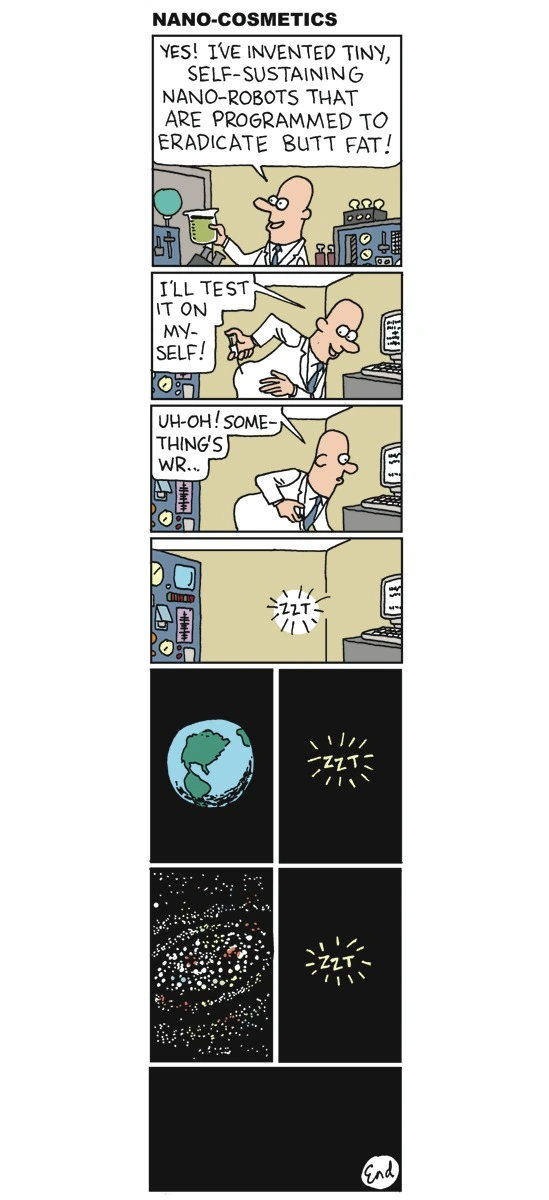this post was submitted on 25 Feb 2024
370 points (92.2% liked)
Comic Strips
13816 readers
3066 users here now
Comic Strips is a community for those who love comic stories.
The rules are simple:
- The post can be a single image, an image gallery, or a link to a specific comic hosted on another site (the author's website, for instance).
- The comic must be a complete story.
- If it is an external link, it must be to a specific story, not to the root of the site.
- You may post comics from others or your own.
- If you are posting a comic of your own, a maximum of one per week is allowed (I know, your comics are great, but this rule helps avoid spam).
- The comic can be in any language, but if it's not in English, OP must include an English translation in the post's 'body' field (note: you don't need to select a specific language when posting a comic).
- Politeness.
- Adult content is not allowed. This community aims to be fun for people of all ages.
Web of links
- [email protected]: "I use Arch btw"
- [email protected]: memes (you don't say!)
founded 2 years ago
MODERATORS
you are viewing a single comment's thread
view the rest of the comments
view the rest of the comments

Grey goo is a fun idea but doesn't really work.
Radiation would cause replication errors in the nanobots, eventually leading to speciation. Before you know it you just have an ecosystem again, with a whole food chain of butt eradicators and paperclip maximizers.
Sorry this will be my band name now
Pretty sure nature does have checksums in some places. IIRC, there are some genetic sequences that are surprisingly resistant to mutation upon copying, but the same doesn't apply to every sequence on account of, I assume, it being expensive in some way.
I am not sure what to search to find what I think I remember.
They would have to mutate in a way that would either overpower the original very quickly or in a way that they were unidentifiable.
Most likely though the original would recognize the mutation as an outsider and immediately terminate it.
a fellow universal paperclip enjoyer, i see
I don't think this is necessarily true. The reason DNA is so affected by radiation is because it's malleable. It's built out of chemical building blocks that fit like Lego. Gray goo would likely be similar to extremely complex proteins which replicate like a physical version of a quine.
I'm not talking about little tiny robots with batteries and computers, I'm talking about precisely formed, microscopic and deformable chunks of metal. That's why I brought up proteins- they do not carry any information themselves, and can sometimes form duplicates of themselves, such as in the case of prions.
Grey goo also doesn't work because it'd almost certainly use the same building blocks as life, and in a competition with life, life's probably going to be the winner. Even if it didn't, unless it's doing weird cold fusion subatomic interactions (probably impossible) to make more of whatever element it's composed of, it'll just run out of food in whatever local environment it's in.
IIRC the bigger issue is that the nanobots would end up just melting themselves, to avoid this they'd have to work a lot slower, probably at about the rate of a particularly fast acting bacteria.
Whilst I agree that universal consuming nanobots are a bit far fetched, I’m not sure I’m sold on the replication problem.
Life has replication errors on purpose because we’re dependent on it for mid to long term survival.
It’s easy to write program code with arbitrarily high error protection. You could make a program that will produce 1 unhandled error for every 100000 consumed universes, and it wouldn’t be particularly hard, you just need enough spare space.
Mutation and cancer are potential problems for technology, but they’re decidedly solvable problems.
Life only makes it hard because life is chaotic and complex, there’s not an error correcting code ratio we can bump from 5 to 20 and call it a day.